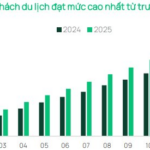The Urgent Population Crisis
On October 12th, the National Assembly’s Committee on Culture and Society continued its plenary session to review the Population Law.
Addressing the issue, National Assembly Deputy and Professor Nguyen Thien Nhan (Ho Chi Minh City) emphasized that Vietnam is facing an “urgent situation” regarding its population. He warned that without a legal framework to address this issue, Vietnam risks following the same path as Japan, South Korea, and other nations.

Prof. Nguyen Thien Nhan advocates shifting from minimum wage to a wage sufficient to support two children.
He noted that Japan, despite its 13% annual economic growth, has faced 50 years of sub-replacement fertility and labor shortages.
According to Prof. Nhan, the consequences of sub-replacement fertility can last 50 to 100 years, and delaying action will eliminate any chance of recovery.
Similarly, Singapore, despite its economic prosperity, has struggled with low birth rates for years and has relied on immigration policies to sustain growth.
“We are at a crossroads: develop or stagnate,” Prof. Nhan stated.
He highlighted that Vietnam is the only country with a dedicated resolution on population management in the new context, aiming to maintain replacement-level fertility. However, this goal has not been achieved after years of effort.
Further Adjustments to Retirement Age
The Ho Chi Minh City delegate emphasized the Politburo’s directive for three breakthroughs in the new development phase: mindset, policy, and implementation. “The Population Law must reflect a breakthrough in thinking,” he stressed.
He identified three major challenges Vietnam faces:
First, replacement fertility has declined continuously over the past three years. This mirrors the trend in South Korea, Japan, and over 40 developed nations, where higher per capita income correlates with lower birth rates.
Second, Vietnam’s retirement age is relatively low, currently averaging 60 years and gradually increasing, but the “golden population” period has long passed.
He explained that in other countries, the golden population is defined when the working population is twice the non-working population. To utilize the 60-64 age group, a reasonable retirement age adjustment is necessary. Without this, significant societal resources will be wasted.
The third challenge, he noted, is the 11 direct causes of declining birth rates identified through international research.
Globally, since 1970, modern contraception has been effective, and as countries become less impoverished, they self-regulate family size. The second cause is that the income of two working individuals is insufficient to raise two children, leading to smaller families.
Prof. Nhan pointed out that businesses, driven by profit maximization, prefer paying minimum wages rather than wages sufficient to support two children. Consequently, in many countries, 40% of households cannot afford to raise two children.
He warned that in 30 years, there may not be enough labor to sustain production. Therefore, a shift from minimum wage to a wage sufficient for two children is essential. “We need a breakthrough in awareness, policy, and solutions,” he concluded.
Streamlining Governance: Cutting 145,000 Public Sector Jobs to Save $1.6 Billion Annually
Following the restructuring of the administrative apparatus, the total number of civil servants and public employees has been reduced by 145,000, resulting in an annual decrease in regular expenditures by 39 trillion VND.
Unleashing a New Wave: Domestic Consumption and Market Upgrades Drive Momentum
The consumer and retail stock sector is entering its most anticipated phase in years, fueled by a convergence of robust corporate growth and positive international capital flows. A resurgence in domestic purchasing power, coupled with the expansion of modern retail channels, is driving significant profit improvements for leading companies in the third quarter of 2025.
Launch of the Low-Altitude Economy Alliance (LAE): Aiming to Create 1 Million Jobs and Generate Billions of USD for Vietnam
The LAE Alliance was established with a visionary goal: to position Vietnam as a regional leader in the low-altitude economy, ultimately transforming it into the global hub for this innovative sector.




















